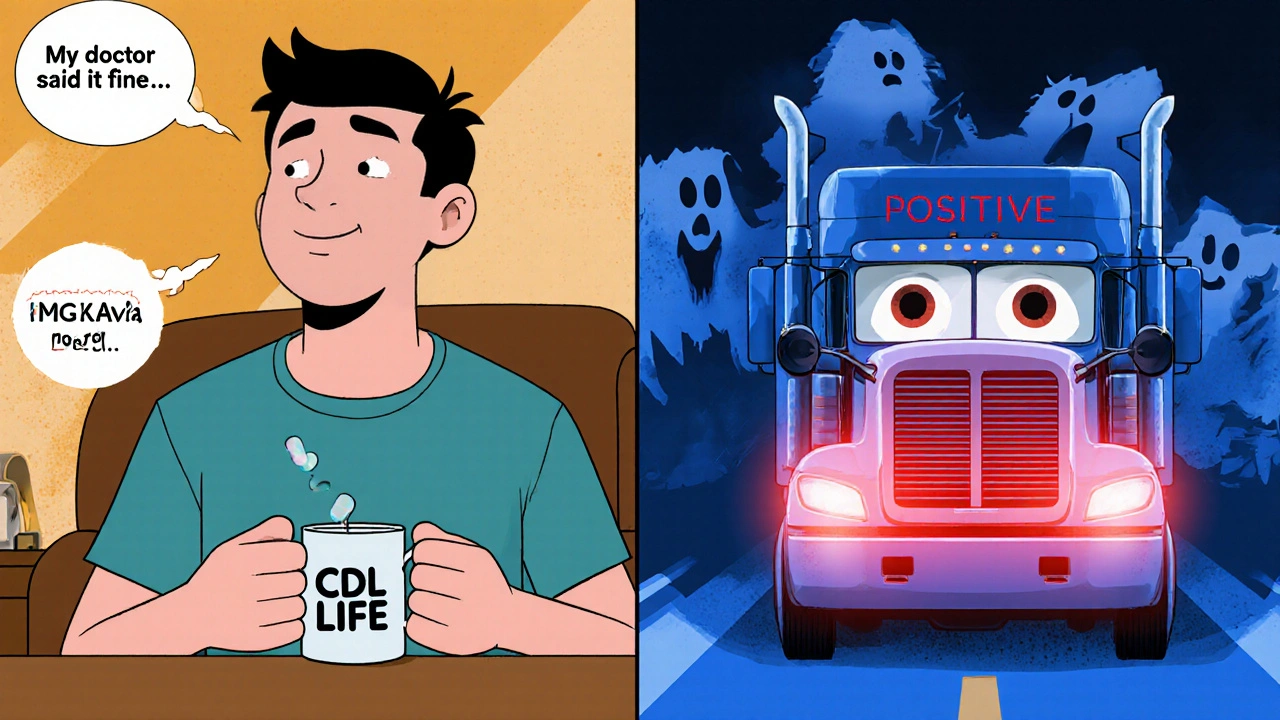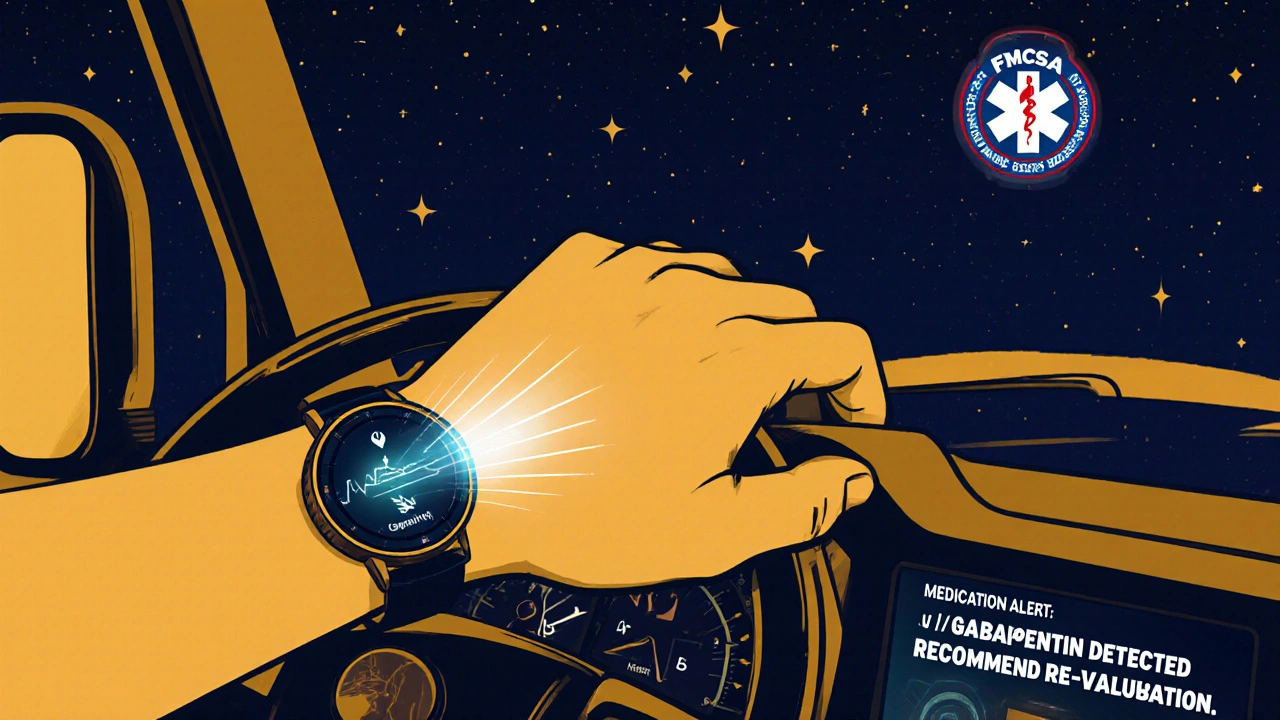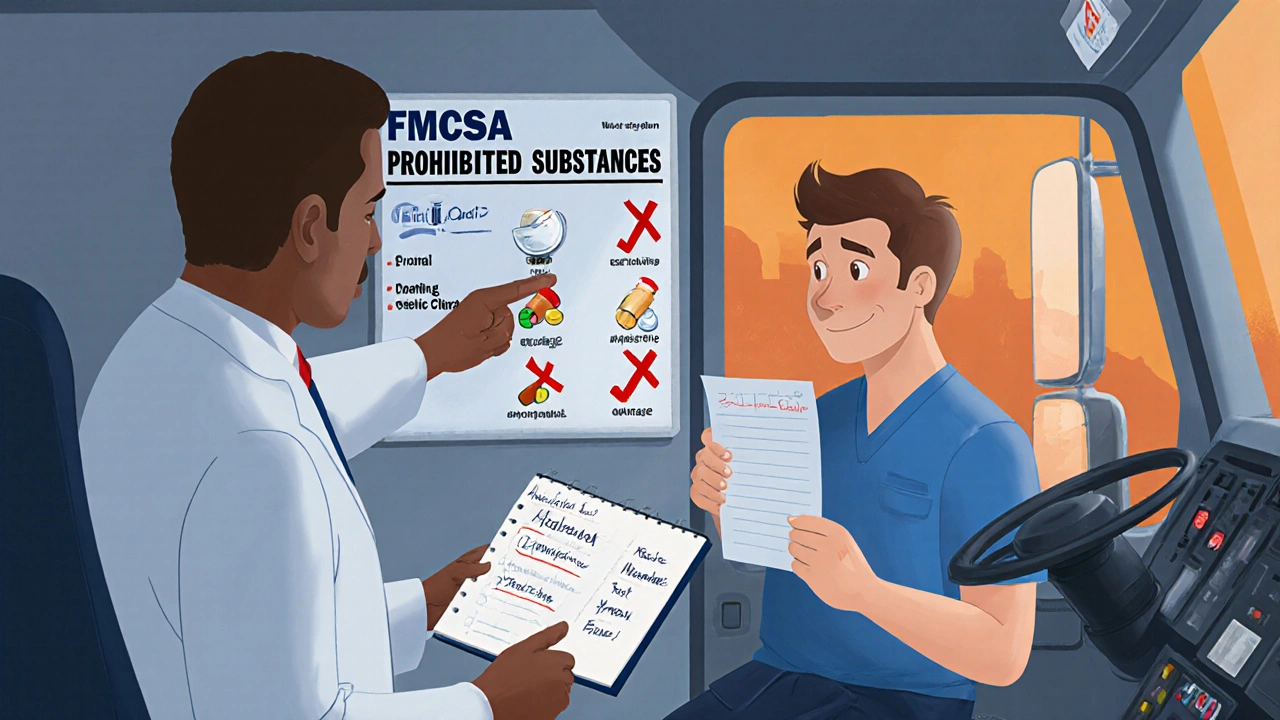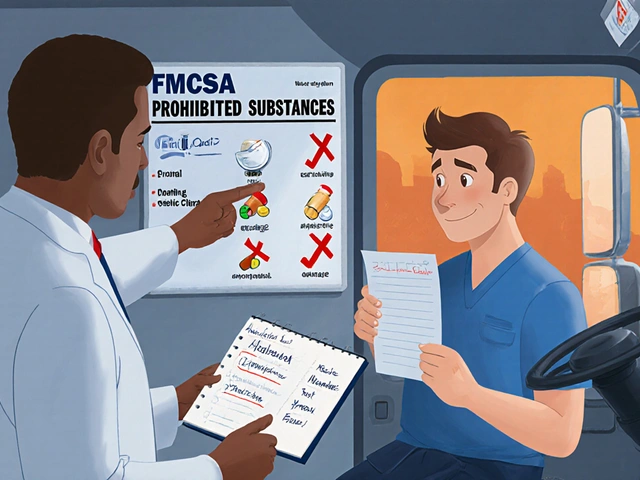Driving a commercial vehicle isn't just about knowing the roads-it's about staying alert, focused, and in full control at all times. But what happens when you're taking medication for a chronic condition? For commercial motor vehicle (CMV) drivers, the answer isn't as simple as "take your pills as prescribed." The Federal Motor Carrier Safety Administration (FMCSA) enforces strict rules that can override even a doctor's prescription if it's deemed a risk to public safety. This isn't about punishment-it's about preventing crashes that could kill innocent people.
What Medications Are Banned for CDL Drivers?
The FMCSA doesn't just ban illegal drugs. It also prohibits certain prescription and over-the-counter medications that can impair driving ability. The list includes Schedule I substances like marijuana-even if it's legal in your state-and powerful stimulants like amphetamines, including Adderall and Vyvanse. Narcotics such as codeine, oxycodone, and hydrocodone are also off-limits, regardless of medical need.
Even common OTC meds can get you in trouble. Pseudoephedrine, found in many cold and allergy pills, can trigger false positives on DOT drug tests. Dextromethorphan, an ingredient in cough syrups, can cause drowsiness or dizziness. These aren't hidden rules-they're clearly listed in the FMCSA's 2023 Guidance on Medication Interactions. Drivers must disclose every medication they take during their DOT physical, even if they think it's harmless.
Why such a hard line? In 2020, 4.2% of large truck crashes involved drivers who tested positive for disqualifying substances, leading to 1,247 deaths. The FMCSA doesn't wait for accidents to happen. They act on data: medications that cause drowsiness, blurred vision, slowed reaction time, or impaired judgment are banned because the consequences are too severe.
Prescriptions Aren't Automatically Approved
Many drivers assume that if a doctor prescribes it, it's okay. That's not true under DOT rules. A prescription doesn't override federal safety standards. The FMCSA requires three things for any medication to be allowed:
- It must be prescribed by a licensed physician.
- The physician must make a "good faith judgment" that the medication won't impair driving at the prescribed dose.
- The driver must take it exactly as directed-no extra pills, no skipping doses.
Even then, the final decision rests with the certified Medical Examiner (ME) during the DOT physical. These examiners are trained to spot drug interactions and side effects. Dr. Gary Solomon, a DOT ME with over 20 years of experience, says about 35% of drivers he examines are on medications that need extra review. Antidepressants top the list-not because they're dangerous, but because they can cause drowsiness, weight gain, or changes in alertness.
Doctors who treat CDL drivers are now encouraged to ask for a detailed job description. "Title alone doesn't tell me if a driver is hauling hazardous materials at 3 a.m. or making local deliveries during daylight," says the American Medical Association's 2022 guidelines. A medication that's safe for an office worker might be risky for someone behind the wheel of an 80,000-pound truck.
What Happens If You're on a Disqualified Medication?
If your medication is on the FMCSA's prohibited list, you won't automatically lose your CDL. But you won't get your medical certificate either-until you fix the issue. Here's how the process works:
- During your DOT physical, you must disclose every medication you're taking.
- If the Medical Examiner flags a drug, they'll issue a temporary certificate with restrictions.
- You'll need to work with your doctor to switch to an approved alternative.
- Once you're stable on the new medication, you return for a follow-up exam.
Some drivers have no choice but to stop taking their medication. A 2022 survey by the Owner-Operator Independent Drivers Association found that 63% of CDL holders had to quit effective pain meds because of DOT rules. Forty-one percent said their health got worse as a result. One driver in Texas, who took gabapentin for nerve pain, had to go without treatment for six months because no approved alternative worked. He lost weight, slept poorly, and nearly crashed twice before switching to non-opioid physical therapy.
There are exceptions. The FMCSA's Skill Performance Evaluation (SPE) certificate allows drivers with certain physical impairments to operate CMVs with special equipment. About 68% of SPE applications are approved. For example, drivers using CPAP machines for sleep apnea have a 92% compliance rate-they're not banned, they're managed.

ADHD Medications and CDL Drivers: A Common Conflict
One of the most controversial bans is for stimulant medications used to treat ADHD. Adderall, Vyvanse, Ritalin-these drugs help many drivers stay alert and focused. But under DOT rules, they're banned outright. Why? Because stimulants can cause jitteriness, anxiety, insomnia, and heart palpitations-all of which can distract or endanger a driver.
Reddit threads like r/Truckers are full of stories. One driver lost his license after a random drug test picked up Adderall. He had a valid prescription, but the FMCSA doesn't care. Another driver switched to Strattera, a non-stimulant ADHD medication, and passed his DOT physical after three months of stability. TruckersReport.com documented 43 cases where drivers successfully appealed for medical clearance after switching to non-stimulant options.
There's no gray area: if you're on a stimulant for ADHD, you can't hold a CDL unless you stop taking it. And you can't just quit cold turkey-withdrawal can cause fatigue, depression, and poor concentration, which are just as dangerous as the original condition. Work with your doctor to taper off safely and find an alternative.
The Real Cost of Compliance
Getting and keeping your CDL isn't just about driving skills. There's a financial and emotional toll. DOT physicals cost between $85 and $150. If you need to switch medications, you'll pay for new prescriptions, follow-up visits, and possibly therapy. Some drivers spend hundreds of dollars a year just to stay compliant.
Carriers aren't off the hook either. The FMCSA's 2023 Compliance Review found that 28% of trucking companies failed medication management audits. Fines average $14,200 per violation. That's why more companies are turning to electronic tracking systems-up from 18% in 2019 to 67% in 2024. These systems flag medications that conflict with DOT rules before a driver even hits the road.
And then there's the Drug and Alcohol Clearinghouse. Since its launch in 2020, over 12,800 drivers have sought medical review for medication issues in the first quarter of 2024 alone. Sixty-eight percent received conditional certifications, meaning they're allowed to drive-but only if they follow strict rules and return for re-evaluation.

What's Changing in 2025?
The rules aren't static. In February 2024, the FMCSA proposed expanding the list of reportable medications to include all benzodiazepines-drugs like Xanax, Valium, and Klonopin-regardless of prescription status. Why? NHTSA data showed a 22% increase in benzodiazepine-positive crash tests between 2019 and 2023. These drugs are often prescribed for anxiety or insomnia, but they cause drowsiness and delayed reaction times-exactly what you don't want behind the wheel.
Starting April 1, 2024, any medication-related restriction must be reported to the Clearinghouse within 24 hours. Failure to do so triggers an automatic $1,250 fine. This is a big shift-it means drivers, doctors, and carriers are now legally responsible for real-time reporting.
The future might bring even more changes. The FMCSA is funding a $4.7 million pilot program with Samsara and KeepTruckin to test biometric wearables that detect real-time impairment. Imagine a smartwatch that monitors your heart rate variability, eye movement, or reaction speed-and alerts your carrier if you're too tired or medicated to drive safely.
But there's a warning. The Commercial Vehicle Medical Research Foundation estimates that 43% of drivers over 50 take at least one medication that conflicts with DOT standards. Without policy changes, they predict a driver shortage of 54,000 by 2027. Many experienced drivers may be forced to retire early-not because they're unsafe, but because their health needs can't be met under current rules.
What Should You Do If You're on Medication?
If you're a commercial driver and take any medication, here's your action plan:
- Disclose everything. Don't hide OTC meds, supplements, or herbal remedies. The ME will ask for a full list.
- Talk to your doctor. Bring your job description. Ask: "Is this safe for a CDL driver?" If they're unsure, ask for a referral to a specialist familiar with DOT rules.
- Check the FMCSA list. Visit the FMCSA website and search for your medication. If it's on the prohibited list, don't wait-start exploring alternatives now.
- Keep records. Save copies of prescriptions, doctor's notes, and any correspondence with your ME. You might need them later.
- Use the Driving Impairment Checklist. Rate your alertness, focus, and reaction time daily. If you notice a drop after starting a new med, report it immediately.
There's no shame in needing medication. But if you're behind the wheel of a commercial vehicle, your health isn't just your business-it's everyone else's safety too. The system isn't perfect, but it's built on decades of data and tragedy. Your job isn't just to drive-it's to protect.
Can I drive a commercial vehicle if I use medical marijuana?
No. Even if medical marijuana is legal in your state, it's still a Schedule I controlled substance under federal law. The FMCSA bans all forms of marijuana, including oils, edibles, and tinctures. Testing positive for THC will result in immediate removal from safety-sensitive duties and mandatory return-to-duty procedures.
Are antidepressants allowed for CDL drivers?
Some antidepressants are allowed, but not all. SSRIs like sertraline (Zoloft) and escitalopram (Lexapro) are generally permitted if they don't cause drowsiness or impair judgment. However, tricyclic antidepressants and MAOIs are often disqualifying due to side effects like dizziness and slowed reaction time. Always disclose your medication and get approval from your Medical Examiner.
What if I need pain medication after an injury?
Narcotic painkillers like oxycodone or hydrocodone are prohibited. You'll need to work with your doctor to find non-opioid alternatives such as NSAIDs (ibuprofen, naproxen), acetaminophen, or physical therapy. In rare cases, a Medical Examiner may grant a temporary exception if the medication is short-term and you're under close supervision.
Can I use CBD oil as a CDL driver?
No. Even if the CBD product claims to contain less than 0.3% THC, there's no guarantee it's free of detectable THC. DOT drug tests screen for THC metabolites, and any positive result-even trace amounts-will disqualify you. The FMCSA does not recognize CBD as an approved medication for commercial drivers.
How often do I need to renew my DOT medical card if I'm on medication?
Standard DOT medical certificates are valid for 1 to 3 years, depending on your health. But if you're on a medication that requires monitoring, your Medical Examiner may issue a short-term certificate-usually 3 to 90 days-until they can confirm the medication isn't affecting your driving ability. You'll need to return for a follow-up exam before the certificate expires.



Comments
Just took my DOT physical and got cleared on Zoloft-glad this post exists. Stay safe out there, drivers.
For real-most drivers don’t realize how many OTC meds trip DOT tests. Pseudoephedrine? Yeah, that’s a red flag. I’ve seen guys get pulled over for Sudafed. Always check the FMCSA list before you buy anything. Your license isn’t worth risking for a cold pill.
I’ve been driving for 22 years. I’ve seen guys lose everything because they thought "it’s just a prescription." Your doctor doesn’t know the FMCSA rules. They treat patients. You’re a safety-critical operator. Period. If your meds make you drowsy, dizzy, or jittery, you’re not fit to drive a semi. It’s not about freedom-it’s about not killing someone because you were too lazy to switch meds.
They’re using this to control us. Big Pharma and the government teamed up to push us off stimulants so they can sell you their "safe" antidepressants that cost $500 a month. Adderall saved my life-now I’m supposed to drive tired because some bureaucrat thinks I might get anxious? Wake up. This isn’t safety-it’s corporate control.
FMCSA 49 CFR 391.41(b)(12) explicitly prohibits any substance listed under Schedule I–V that impairs CNS function. Stimulants, opioids, benzodiazepines-all fall under this. The 2023 Guidance Document clarifies that even off-label use triggers disqualification. Medical examiners are required to cross-reference with the NIDA Drug Classification Matrix. Ignorance is not a defense. You’re either compliant or you’re off the road.
OMG, this is so deep!! Like, I didn’t realize that CBD is a trap?? And they’re gonna use biometric wearables?? Like, are we turning into Black Mirror?? I mean, I get it, but… my soul?? 🤯
Why even bother getting a CDL if you gotta be a robot? I got depression, I take my pills. If I crash, fine. But don’t take my meds and call it safety. This system is rigged.
The ethical tension here is profound: individual bodily autonomy versus collective public safety. The state’s paternalism, while ostensibly benevolent, imposes a monolithic standard of fitness that erases the nuanced reality of chronic illness. One cannot reduce the human condition to a binary of "safe" and "unsafe"-especially when the metrics are derived from aggregated crash data, not individualized risk assessment. The result is a system that sacrifices lived experience on the altar of statistical probability. Is this justice-or merely the institutionalization of fear?
They’re not banning drugs-they’re banning human beings who need them. You think the guy with chronic nerve pain who can’t sleep or sit down is a threat? No. He’s the guy who’s been driving 12 hours straight because he can’t afford to quit. The system doesn’t care. It just wants clean test results. And that’s not safety. That’s dehumanization.
Wait-so the same government that lets Big Pharma flood the country with opioids bans the very meds that help people survive? And you think that’s not a setup? The Clearinghouse? Biometric watches? This is the first step to mandatory drug implants. They want to control your brainwaves before you even get behind the wheel. Don’t be fooled. This is surveillance disguised as safety.
They banned Adderall? Oh, so now the government decides what’s "safe" for my ADHD? Meanwhile, they let truckers drink coffee, Red Bull, and energy gels that have more caffeine than a triple shot-but if I take my prescribed stimulant? I’m a menace. This isn’t about safety-it’s about control. And they’re coming for the next group next. You think you’re safe? You’re not.
Let me be clear: if you’re on anything that’s not FDA-approved for truckers, you’re playing Russian roulette. No exceptions. No excuses. Your life isn’t the only one at stake. You’re responsible for 80,000 pounds of steel and everyone around you. If you can’t manage your health to meet the standard, you don’t belong on the road. Period.
the fmsca is just a front for the corpocracy. they dont care about safety. they care about liability. if you crash, they dont want to be sued. so they ban meds. easy. they dont care if you die of pain. they dont care if you go broke. they just want clean audit trails. this is capitalism. not safety.
They’re turning our highways into corporate test zones. Biometric wearables? Real-time impairment tracking? Next thing you know, your rig will have an AI that locks the steering wheel if your cortisol spikes. They don’t want drivers-they want obedient machines. And if you’re human enough to need medicine? You’re a glitch in the system. They’ll replace you with a self-driving rig before they let you drive with a prescription.
Let’s be honest: this system is designed to push out the older, medicated drivers so the younger, cheaper, and more compliant ones can take their place. The driver shortage? Manufactured. The "safety"? A cover. They don’t want to fix the system-they want to replace the people in it. And if you’re over 50 and on gabapentin? You’re not a driver anymore. You’re an obsolete asset.